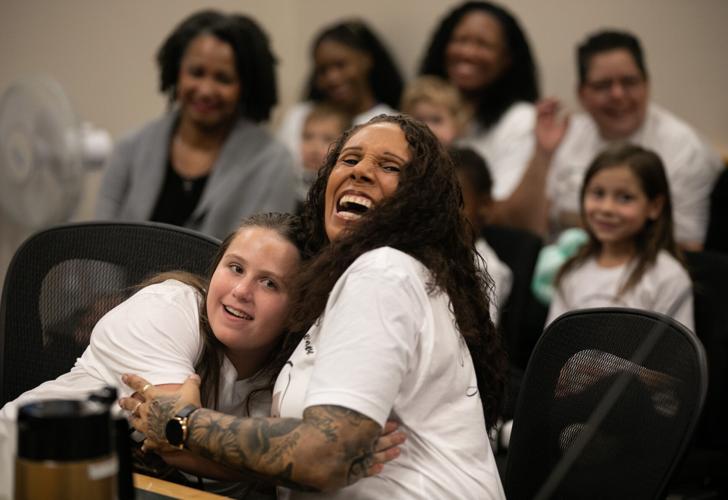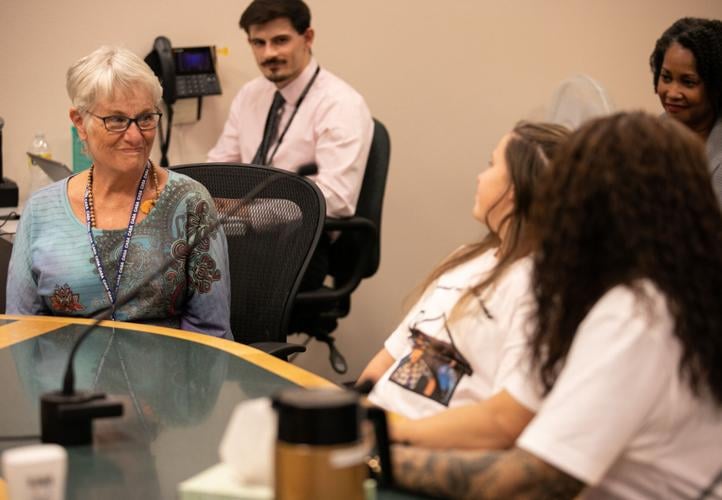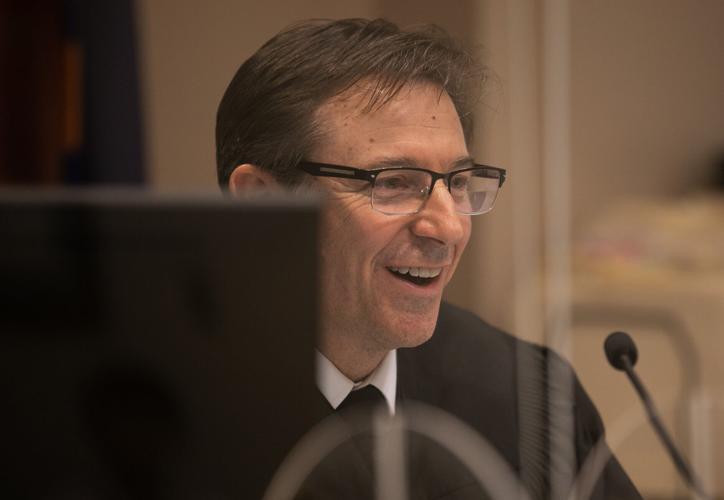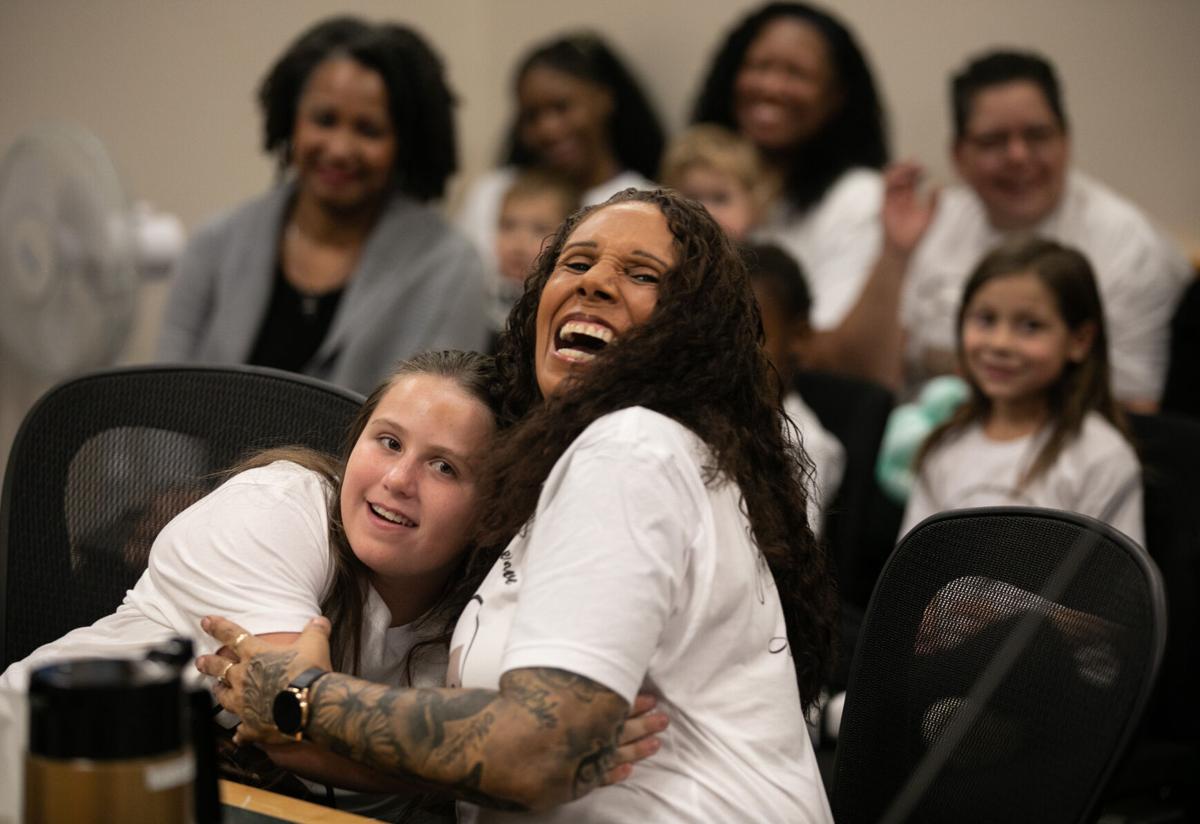Michele Keller first tried to bring Ariana into her family a decade ago, when the child was 3 months old.
She was told then it would never happen, due to her relationship with Ariana’s biological mother, but Keller never stopped thinking about the girl.
Nine years later, Keller was fostering Ariana’s half-brother and learned that Ariana still hadn’t been adopted. She reached out to the Department of Child Safety, offering again to take her. A few months later, when Ariana’s 16th foster placement decided they no longer wanted her, Keller welcomed the child into her home.
It was a long road, but they made it official last week and Keller adopted Ariana in front of family and friends, thanks in part to the support of Ariana’s court appointed special advocate.
CASAs are trained volunteers appointed by a judge to represent a child’s best interest throughout the court process. CASAs spend time with the children they represent, keeping track of their medical, psychological and social needs; making sure they can be successful in school; and submitting ongoing reports to the judge in the child’s case.

As of Oct. 31, there were 2,863 Pima County children under the state’s care, but there are only enough CASA volunteers to represent 7% of those children. Nearly all of Pima County’s CASAs are maxed out on cases, but thousands of children are still in need.
Bringing stability to children’s lives
Dozens of adoptions were carried out at Pima County Juvenile Court on last week’s National Adoption Day, but many of those children went through a lengthy court process without the support of a CASA. Parents, lawyers and especially judges recognize the benefits of having a CASA involved in a case, but perhaps more importantly, involved in the child’s life.
There are nearly 1,000 CASA programs around the country. The program got its start in Seattle in the late 1970s, when a juvenile court judge became concerned about making life-altering decisions based on insufficient information. The judge came up with the idea of citizen volunteers speaking up for a child’s best interest in court, and there are now CASAs in 49 states.
Pima County Juvenile Court’s CASA program was the first in Arizona, said Presiding Judge Peter Hochuli. When he started working in Tucson as a contract attorney in 1986, there was one person running the county’s CASA program. It’s since grown exponentially, with hundreds of volunteers over the years and 14 employees.
Hochuli said a CASA can make a significant difference to a child who perhaps has been lacking a stable adult in his or her life.
Pima County’s Juvenile Court operates under a “one family, one judge” model, meaning that unlike in Superior Court, a family and child will stay with the same judge for the duration of their involvement with the court, even if there are cases on both the custody and criminal sides.
“We become very familiar with the families,” Hochuli said.
But aside from the judge, the cast of characters in a child’s court experience frequently changes, unless there is a CASA.
CASA volunteers undergo 30 hours of pre-service training and complete 12 hours of in-service training each year. Their scheduling is flexible, and while each case is different, CASA volunteers usually devote 15-20 hours per month to spending time with the child and doing research. The CASA program also organizes group activities, including trips to farmers’ markets and visits to ropes courses and amusement parks.
Because the CASA program is operated by the courts, it can’t fundraise or accept donations, which is where the CASA Coordinating Council of Pima County comes into play. The group provides support for CASAs and the children with whom they work, including tutors, technology and more. The council is also volunteer-based.
“That’s such an important component, because so many things we take for granted. If one of our children wants to play sports, we come up with the fee and we get the baseball glove,” said Juvenile Court Commissioner Geoffrey Ferlan. “Children in foster care really have limited resources and it’s these types of organizations and these types of people that are making a difference for these children.”
Especially needed: men, people of color, young people
In addition to providing the child with support and stability, CASAs also write regular reports for the judge about what they think is in the best interest of the child. They’re also asked to attend court hearings if they’re able, although they aren’t required to speak.
Hochuli said CASA reports are one of the first things he reads in a child’s case file, even before the Department of Child Safety report, because it’s more detailed and gives him an opportunity to personalize his interactions with each child.
“There’s nothing more meaningful to them when I’m sitting there eye-to-eye and I know stuff going on in their life,” he said. “It’s a safe place. We want to connect, because no attorney can truly tell us what the child is feeling.”
Hochuli said a common refrain among the county’s Juvenile Court judges is: “’I wish we could have a CASA on every case.’”
The volunteers “get to opine on where they think this case should be going. Some of them end up by virtue of their involvement creating motivation for the parents,” Hochuli said. “They become, in a way, the eyes and ears of the court, as well.”
Keller’s adoption attorney, Heather Strickland, said by the time she gets involved, CASA volunteers have done the hard work advocating for the child but still often assist in that final stretch.
“Especially when you have older children, who are really not sure if they want to be adopted, which is totally understandable and normal,” Strickland said. “They also help explain the benefits of doing an adoption at a certain time, like waiting until a child reaches the age of 16 or until the end of the year.”
Pima County’s CASA program had received only 94 volunteer applications in 2022 as of the end of October, while 157 CASAs represent 210 children in court.
Ferlan said there’s been a push over the years to recruit diverse volunteers from different backgrounds, which helps foster tight-knit connections between CASAs and the children with whom they work.
“The demographics of the volunteers are extremely diverse nowadays,” Ferlan said. “I think that comes with numbers, but I think there’s also a lot of effort to identify people who come from varying backgrounds. Then you can really find a match that’s going to benefit the child as much as possible.”
The program is especially seeking men, people of color and young people. In addition to CASAs, there’s also a need for more foster and adoptive parents, Ferlan said.
“The community being as it is, which is really kind of a family orientation, I think is positioned really nicely to produce people with big hearts, great backgrounds that really want to make a difference for children,” Ferlan said. “It takes people with just a real deep devotion, and we’ve got that.”

Connie Lucas, court appointed special adviocate, grins at Ariana Keller and her new mom, Michele Keller, in Judge Geoffrey Ferlan’s courtroom at Pima County Juvenile Court.
‘And now she’s home’
Ten-year-old Ariana worked with the same CASA for nearly three years, meeting Connie Lucas more than a year before she moved in with Michele Keller.
Lucas, a retired infant mental health specialist from Washington state, became a CASA after moving to Tucson in 2017.
“I had a career since 1986 of working with children in different roles. I still have energy and I wanted to share my expertise and what I can share to help children,” Lucas said. “It can be the most rewarding work. As long as I have energy and am well, I want to do the work.”
Lucas was present for Ariana’s adoption, sitting next to Keller and beaming proudly throughout.
“It takes a village,” Keller said. “I think we both have helped each other out. I’ve filled in the blanks for a lot of [Ariana’s] history that other people didn’t know about. And when I do need that moment of a break ... Connie, if she’s not busy, can take Ariana, and that just helps us all out.”
CASAs can also provide respite care for foster parents, helping out with child care when needed.
Keller, who has adopted children in the past, said her other kids didn’t have CASAs in their cases.
“I’m real appreciative of having people on mine and Ariana’s sides to help us get through this,” Keller said. “It was a long process.”
In addition to Lucas, Keller and Ariana had an entourage of at least 10 filling up the small gallery, many sporting matching white T-shirts emblazoned with photos of Ariana encased in a heart and the words, “I found my forever home.”
Ferlan conducted her adoption hearing, asking Keller if she believed it was in Ariana’s best welfare to be adopted.
Keller turned to the child, asking, “What do you think?”
Ariana nodded vigorously as a chorus of chuckles broke out in the courtroom.

Geoffrey Ferlan conducts the adoption proceeding for Ariana Keller at Pima County Juvenile Court in Tucson on National Adoption Day, Nov. 18, 2022.
Friends and family cheered loudly as Ferlan made the adoption official.
“And now she’s home,” Keller said.
‘Celebrating with them’
Last week’s Adoption Day was the first since 2019. It was also the first at Pima County Juvenile Court Center, with staff going all out for the occasion.
With a scavenger hunt to keep kids and teens busy as they waited for their hearing, hundreds of cookies baked in the nearly-empty detention center kitchen, and a staff member making balloon animals, Friday was nowhere near a typical day in court.
Disney princesses strolled through the lobby, stopping repeatedly for photos, and corrections officers assigned to the court passed out stickers.
With 10 judges conducting simultaneous hearings, nearly 70 children were adopted into 55 homes. It’s the best day of the year for a Juvenile Court judge, said Ferlan and Hochuli, who were excited to have the event return.
“It feels like we’re celebrating with them,” Ferlan said.
Strickland also called the event her favorite of the year. And this year, with a virtual option for the first time, family and friends could and did join in from around the world.
“Some people say I practice happy law, but I say I practice hopeful law,” the adoption attorney said. “It’s not necessarily happy that people are in a position, whether it’s placing an infant or children being adopted from foster care, but it’s hopeful. We’re hoping for a better outcome for everyone.”








